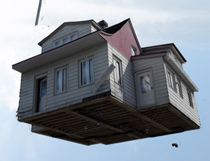Poetry & Fiction Reviews
Red
by George Elliott Clarke,
Hallifax: Gaspereau Press,
157 pp., $19.95
George Elliott Clarke won the Governor General’s Award in 2001 for Execution Poems, and execution is certainly a hallmark of his latest collection of poetry, Red, which fits into his so-called “colouring books†of Blue and Black. The imagery as suggested by the colours is graphic, violent and sexual. And the poems are executed with a disturbing precision and tone.
Clarke displays his erudition flamboyantly, but even more than that, he reveals his utter entrancement with language. His poems take many forms and range through many subjects, but there’s a profound absence of lightness. This is not a guy fooling around on the page. This is not a guy pouring his heart out onto the page. This is a guy with loads of baggage filled with anger. And this is a guy who can express that anger in scary blood-soaked images.
In “Repulsion,†for example, Clarke delineates the entire world as a “slaughterhouse.†Everything turns ugly: “Maggots bask in sunflower stems: / Every beauty turns to slime.†Repulsion is torqued to gasping heights (or depths) in the long poem “The Most Lamentable Tragedy of Titus Andronicus,†in which Clarke takes Shakespeare’s insanely gory play and redelivers the savagery in a profanity laced narrative poem. Shakespeare’s play has rape, mutilation and cannibalism in it—and somehow Clarke manages to make the whole thing even more awful—in both senses. Beware. There’s no holding back of language: “Next, Tamora’s cunt-hunting sons snatch up Lavinia. / Quick, she is bare-assed, spread-eagles. / The uppity bitch ingests two obscene spikes at once.†There’s no such thing as a comfort zone in Clarke’s poetry, dare I say, especially for women. And I doubt that comfort is what interests him.
Along with violence, sex is perceived as a commercial enterprise. In “Fortuna,†a sonnet, the speaker talks of sex as making a deposit: “I deposit, withdraw; she banks, profits– / Time’s all we waste as we lay waste this night.†Wordsworth’s “The World Is Too Much with Us†came immediately to my mind as both poems deal with an essential emptiness at the heart of life. Clarke’s poetry is much more visceral than any poetry I have read lately, and it feels like being punched in the viscera.
Clarke’s imaginative abilities are vast. He riffs on other artists from Pablo Neruda to James Brown, and the collection is filled with allusions to major figures in music and literature. Race is definitely an important topic, and in “Poor Imitation,†he starts by quoting Miles Davis: “Why should some motherfucker make me feel bad because of their ignorance?†The poem goes on to express identification in different places: “Among African-Americans, / I am African American, / okay? / But my accent’s ‘weird’.â€
The colour red is explored from many angles—but they are negative ones. Blood, rot, anger—Clarke’s world pulsates with pain. In the section titled “Red Light District: Acknowledgements,†Clarke includes two lines from Amatoritsero Ede, the editor of the Maple Tree Literary Supplement, and these lines do a great job of capturing the tone of Clarke’s collection: “where are your flaming-red red-light districts / selling hot assorted worm-blown meatâ€.
I had a hard time getting through these poems, and part of the difficulty was an extreme awareness of the masculinity (yes, I’m just going to say that) of the poetry and the fact that I am female. Nevertheless that very difficulty suggests to me that these are poems to read to be jolted and shoved into new perceptions. I would suggest that you read them during daylight, not just before you go to sleep at night.




No Comments so far ↓
There are no comments yet...Kick things off by filling out the form below.